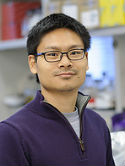Chemicals facilitating reprogramming Book Section
| Authors: | Shi, Z.; González, F.; Huangfu, D. |
| Editors: | Hong, C. C.; Ao, A. S.; Hao, J. |
| Article/Chapter Title: | Chemicals facilitating reprogramming |
| Abstract: | Induced pluripotent stem cells (iPSCs) can be generated from somatic cells by ectopically expressing a set of reprogramming factors. iPSCs hold tremendous promise for cell replacement therapy, drug discovery, and disease modeling. However, the efficiency of iPSC generation is extremely low and the quality of derived iPSCs is often poor. Many small molecules that are able to improve reprogramming by either modifying epigenetic barriers or targeting signaling pathways have recently been identified. Chemical compounds are a unique tool that can not only facilitate reprogramming but perhaps also improve our understanding of the reprogramming mechanism that allows us to generate safe iPSCs for therapeutic use. © 2014 John Wiley & Sons, Ltd. |
| Keywords: | induced pluripotent stem cells; signaling pathway; transdifferentiation; small molecule; epigenetic modifier; lineage reprogramming; reprogramming efficiency; reprogramming to pluripotency |
| Book Title: | Chemical Biology in Regenerative Medicine: Bridging Stem Cells and Future Therapies |
| ISBN: | 978-1-118-34959-5 |
| Publisher: | John Wiley & Sons |
| Publication Place: | West Sussex, United Kingdom |
| Date Published: | 2014-01-01 |
| Start Page: | 141 |
| End Page: | 162 |
| Language: | English |
| DOI: | 10.1002/9781118695746.ch9 |
| PROVIDER: | scopus |
| DOI/URL: | |
| Notes: | Book Chapter: 9 -- Export Date: 2 May 2017 -- Source: Scopus |
Altmetric
Citation Impact
BMJ Impact Analytics
MSK Authors
Related MSK Work





